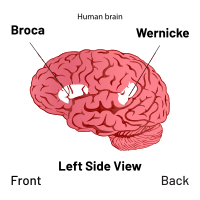
Back بوابة:لسانيات Arabic Портал:Езикознание Bulgarian Portal:Lingüística Catalan Portal:Linguistik German Portal:Lingüística Spanish Portail:Linguistique French Portál:Nyelvészet Hungarian Portale:Linguistica Italian Portal:言語学 Japanese Портал:Лингвистика Macedonian
- For a topical guide of this subject, see Outline of linguistics
Welcome to the Linguistics Portal!Linguistics is the scientific study of language. The areas of linguistic analysis are syntax (rules governing the structure of sentences), semantics (meaning), morphology (structure of words), phonetics (speech sounds and equivalent gestures in sign languages), phonology (the abstract sound system of a particular language), and pragmatics (how the context of use contributes to meaning). Subdisciplines such as biolinguistics (the study of the biological variables and evolution of language) and psycholinguistics (the study of psychological factors in human language) bridge many of these divisions. Linguistics encompasses many branches and subfields that span both theoretical and practical applications. Theoretical linguistics (including traditional descriptive linguistics) is concerned with understanding the universal and fundamental nature of language and developing a general theoretical framework for describing it. Applied linguistics seeks to utilize the scientific findings of the study of language for practical purposes, such as developing methods of improving language education and literacy. Linguistic features may be studied through a variety of perspectives: synchronically (by describing the structure of a language at a specific point in time) or diachronically (through the historical development of a language over a period of time), in monolinguals or in multilinguals, among children or among adults, in terms of how it is being learnt or how it was acquired, as abstract objects or as cognitive structures, through written texts or through oral elicitation, and finally through mechanical data collection or through practical fieldwork. Linguistics emerged from the field of philology, of which some branches are more qualitative and holistic in approach. Today, philology and linguistics are variably described as related fields, subdisciplines, or separate fields of language study but, by and large, linguistics can be seen as an umbrella term. Linguistics is also related to the philosophy of language, stylistics, rhetoric, semiotics, lexicography, and translation. (Full article...) Selected article - Latin pronunciation continually evolved over the centuries, making it difficult for speakers in one era to know how Latin was spoken in prior eras. A given phoneme may be represented by different letters in different periods. This article deals primarily with modern scholarship's best reconstruction of Classical Latin's phonemes (phonology) and the pronunciation and spelling used by educated people in the late Republic and then touches upon later changes and other variants. Did you know...From Wikipedia's "Did You Know" archives: 
Related PortalsThings you can do
WikiProjectsThe following WikiProjects work to improve topics concerned with linguistics:
Associated WikimediaThe following Wikimedia Foundation sister projects provide more on this subject:
Discover Wikipedia using portals |


























